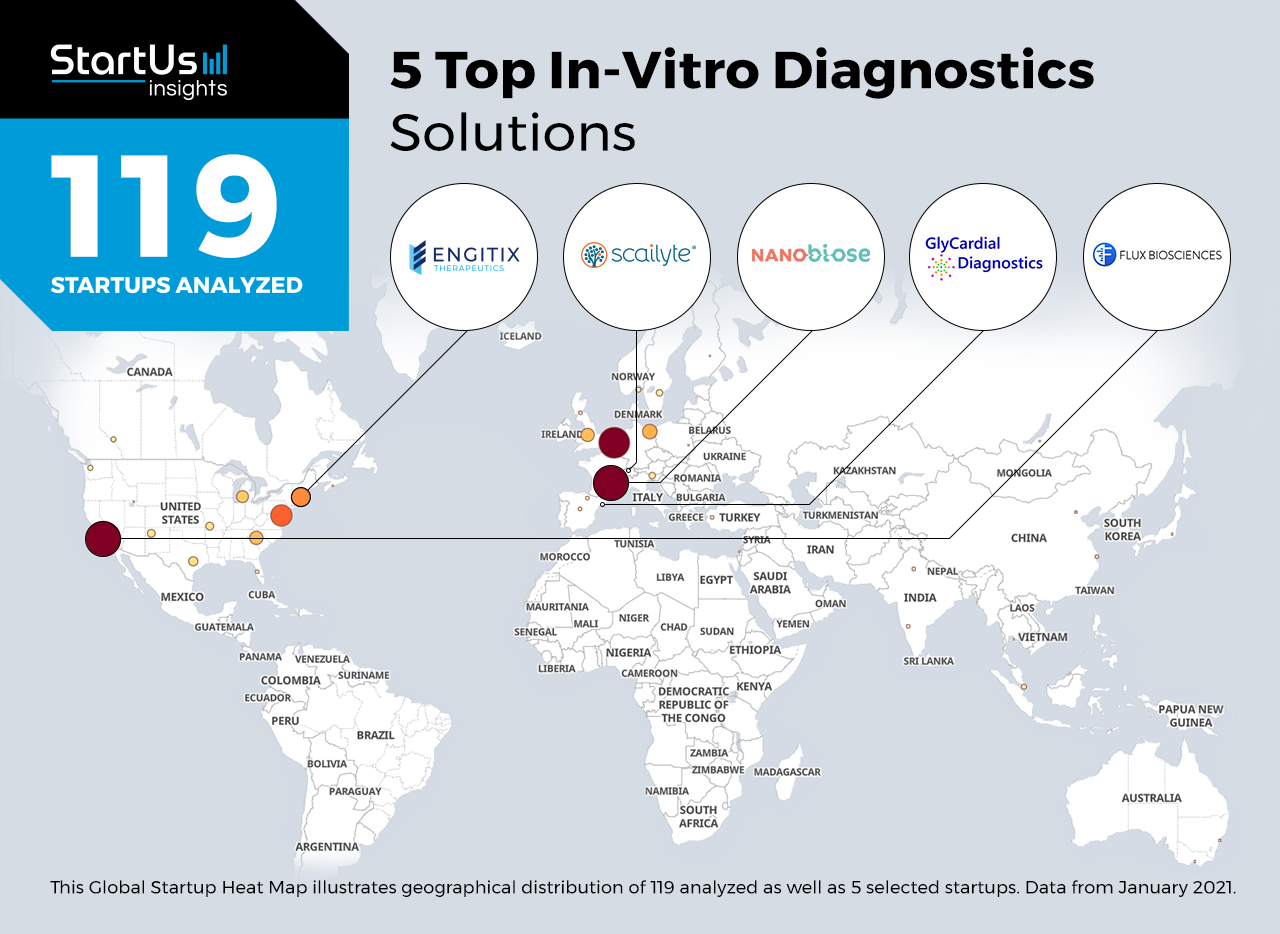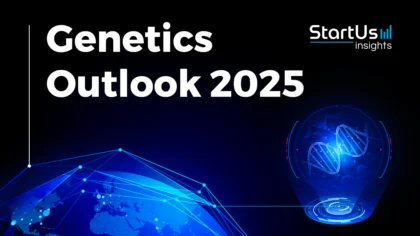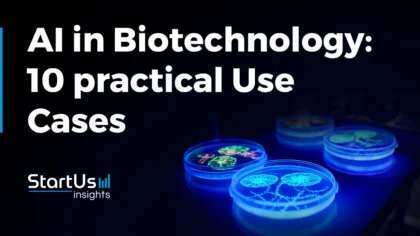Staying ahead of the technology curve means strengthening your competitive advantage. That is why we give you data-driven innovation insights into the BioTech industry. This time, you get to discover 5 hand-picked startups developing in-vitro diagnostics solutions.
Global Startup Heat Map: 5 Top In-Vitro Diagnostics Solutions
The 5 biotech startups you will explore below are chosen based on our data-driven startup scouting approach, taking into account factors such as location, founding year, and relevance of technology, among others. This analysis is based on the Big Data & Artificial Intelligence (AI)-powered StartUs Insights Discovery Platform, covering over 1.3 million startups & scaleups globally.
The Global Startup Heat Map below highlights the 5 startups developing in-vitro diagnostics solutions our Innovation Researchers curated for this report. Moreover, you get insights into regions that observe a high startup activity and the global geographic distribution of the 119 companies we analyzed for this specific topic.
Nanobiose develops Lab-on-Chip Diagnostics
System-on-Chip (SoC) finds applications in embedded devices, personal computers, and mobile computing. Similarly, lab-on-chip technologies are gaining traction in research and development (R&D) in MedTech and BioTech as well. Lab-on-chip systems integrate multiple laboratory functions in a single circuit. Moreover, the compact design allows for the generation of larger amounts of data from smaller quantities of liquids, in a shorter period.
French startup Nanobiose develops a lab-on-chip solution aiming to improve in-vitro analysis for molecular R&D. Nanobiose’s product, SecretCells, utilizes a microfluidic biochip with independent wells for 2D and 3D cells culture in addition to a removable biosensor. These features together allow for the accurate detection of up to 10 biomarkers, including TNF, IL-1beta, IL-2, IFN-gamma, and more.
Flux Biosciences offers Portable Fertility Diagnostics
The coronavirus pandemic has given rise to telepresence and e-commerce solutions to maintain social distancing norms. However, medical diagnostics require in-person tests. Startups develop portable diagnostics solutions that allow users to conduct tests from the convenience of their homes and deliver the results online to their doctors. For example, startups cater to the needs of women by developing easy-to-use and privacy-based solutions.
US-based startup Flux Biosciences manufactures a compact and portable fertility testing device. The device uses patented magnetic biochip technology to read cartridges and urine-based biomarkers. Further, the device wirelessly connects to smartphones or devices and analyzes the presence of four key fertility hormones. The startup’s solution generates results in a few minutes that are then easily shareable with doctors. For example, the device determines the exact day of ovulation, lets users know if they are pregnant and if they should expect certain complications.
Glycardial advances Cardiac Diagnostics for Myocardial Ischemia
According to the World Health Organization, cardiovascular diseases are one of the largest causes of death globally. There has been significant research into cardiovascular diseases with many startups developing solutions to treat them. However, the challenge still lies in the early detection of cardiovascular disease to prevent permanent or long-lasting cardiac damage to the body.
Spanish startup Glycardial specializes in the early detection of myocardial ischemia. The startup’s technology is based on the quantification of specific protein modifications as an approach to detect cardiac ischemia. Glycardial is developing Apo J-Glyc as a biomarker for the diagnosis of cardiovascular disease. The startup’s diagnostic solution aims to prevent irreversible myocardial damage and heart failure.
Scailyte provides Artificial Intelligence-based Cell Analysis
The surge in AI-based solutions propels almost all industries including automotive, computing, and healthcare. MedTech startups are also beginning to utilize the high processing capability of AI to analyze millions of clinical datasets to derive insights and aid in the discovery of biomarkers and other biosignals. For instance, startups develop AI-based algorithms to improve clinical decision-making or discover new drugs.
Swiss startup Scailyte develops in-vitro diagnostics with single-cell technologies using its proprietary single-cell data analysis platform. The startup’s biomarker discovery platform ScaiVision integrates multimodal single cell and clinical data to identify novel disease signatures. For example, ScaiVision drives medical innovation in mass cytometry (CyTOF), high-dimensional flow cytometry, and single-cell RNA sequencing.
Engitix utilizes a Matrix-based Drug Discovery Platform
Pharma R&D of drugs and therapeutics is a complex process with many solutions being rejected during trials. The coronavirus pandemic has diverted several investments into diagnostics solutions for in-vitro and in-vivo clinical research models. Currently, R&D teams do not view matrix-based drug discovery as an efficient process. However, startups are exploring ways to improve and change this perception.
US-based startup Enegitix uses a proprietary matrix-based discovery platform for drug profiling and biomarker discovery. The startup leverages patented protocols that utilize human extracellular matrix (ECM) from tissues. The in-vitro models incorporate human ECM to recreate naturally occurring cell microenvironments for the purpose of efficient drug candidate testing.
Discover more BioTech startups
To keep you up-to-date on the latest technology and emerging solutions, we provide you with actionable innovation intelligence quickly and exhaustively. You can download our free BioTech Innovation Report and discover new business opportunities or save your time & let us look into your areas of interest. We provide you with an exhaustive overview of new startups, scaleups & emerging technologies that matter to you.










